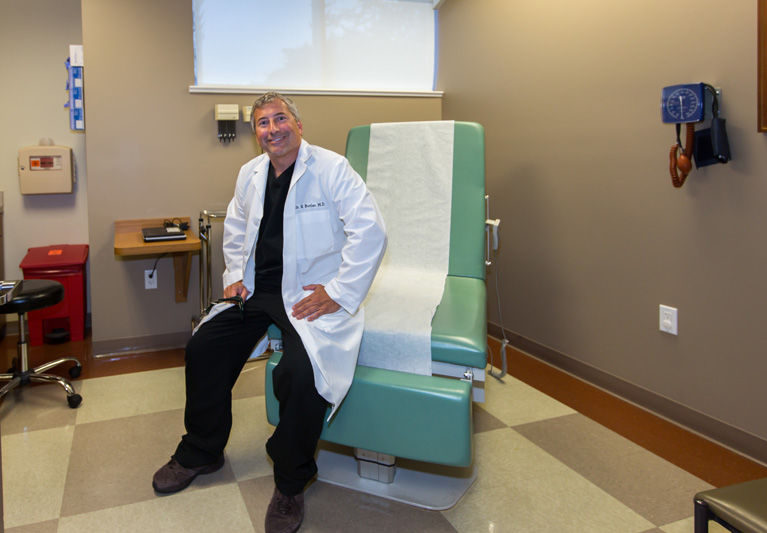
From aches and pains to strains and sprains, summer is a busy time of year for area urgent care facilities. Simply stated, the risk of physical injury tends to rise with the temperature. Nationwide, more people become more active during the summer months.
Children are out of school and are looking to play all day while adults are equally eager to squeeze as much fun as they can out of summer’s extra daylight hours.
Here on the Treasure Coast some of the most common summertime injuries may not be the ones most folks anticipate. Certainly sunburn and heat stress can come into play but so can shellfish, finny fish, kitty cats, things that go boom in the night, bags of briquettes and other people’s medications.
Dr. Chris Olenek of East Side Urgent Care in Vero Beach and Dr. Robert Butler, Indian River Medical Center’s walk-in care medical director in Sebastian, have seen them all.
Butler, a graduate of the University of Western Ontario in Canada, is board certified in emergency medicine and has been practicing in Florida since 1992.
Olenek graduated from the New York College of Osteopathic Medicine with an internship at New York’s famed Mt. Sinai hospital followed by a residency at Columbia University. He is board certified in both emergency and family medicine and has been practicing in this part of the state for over 16 years. These two seasoned Florida physicians are happy to share what they’ve learned.
According to Butler, people in this area should avoid wading into local waterways without their sneakers on. “Those oyster beds,” explains Butler, “will cut your feet up. The cuts fill with sand and they’re just plain nasty.” Washing the wounds with clean water and applying hydrogen peroxide will help.
Olenek points to a more moveable danger. “Sting rays and skates,” he says, have “toxic barbs” that waders, jet skiers and swimmers often step on or are jabbed by and those injuries may require, “in-office surgical removal (of the barb) followed by antibiotics and anti inflammatories.” Olenek calls these injuries, “fairly commonplace” in Vero area waters.
Butler brings up another familiar whiskered creature as a summertime threat to a happy day in the water: catfish.
Injuries from “catfish barbs,” notes Butler, “are even more common” in his Sebastian office that injuries from skates or sting rays. “People often try to reach down and grab the fish and if it jumps, they can get stabbed” by the fish’s barbs or spines. The immediate solution is to bathe the area in hot water, remove the spine with tweezers or small pliers and irrigate the wound. If an infection develops, seek medical care.
Catfish aren’t the only cat to beware of this summer. Cat bites, explains Butler, “get infected about 90 percent of the time.” (Dog bites, he adds, may often look worse but they tend not to get infected nearly as often.) For cat bites, Butler recommends immediate medical care that will likely include a specific type of antibiotic.
If a sting ray, catfish or aggressive kitty doesn’t lacerate your skin this summer, your fishing tackle might.
“The incidence of fishing accidents,” Olenek explains, “is greatest in the summer months,” with fish hooks inadvertently snagging fingers, hands, feet and friends.
Butler says he’s removed “hundreds” of fish hooks from anglers of all ages.
Other typical Florida summertime injuries come from fireworks. Butler warns that, “about 8,700 injuries a year are caused by fireworks,” and quickly points out that even the seemingly innocuous “sparklers” often handed to small children sizzle at approximately 2,000° Fahrenheit and can cause serious burns.
Another common summertime injury comes from channeling one’s inner cave man or cave woman: Cooking steaks and burgers on charcoal or gas grills.
Fortunately, according to Olenek, grilling injuries are not that common in Vero but he adds that, “some burns [caused by grills] can be very serious and may need debridement of tissue, application of special topical antibiotics, IV fluids and intramuscular and oral antibiotics and analgesics.” In moderate to severe burns, a tetanus shot may also be called for.
(The National Fire Prevention Association warns that almost 9,000 house fires are caused by grills, hibachis and barbecues every summer in the U.S. and upwards of 20,000 people require treatment in emergency rooms or urgent care facilities for burns from grilling mishaps.)
Dr. Olenek recommends that everyone participating in outdoor summer activities should keep a first aid kit nearby. Included in that kit, he says, “should be hydrogen peroxide for wounds, Benadryl for insect bites and poison ivy, band aids and gauze strips for lacerations, while Butler says those “shakable” instant ice packs might be a good addition.
One key mistake people often make according to Olenek, is that “they take whatever antibiotic they or their neighbor may have left over” in their medicine cabinet. The East Side Urgent Care doctor sternly warns against that. “Certain infections or injuries,” Olenek explains, “must be treated with specific medications,” adding that taking another person’s prescription is never a good idea.
Finally, both doctors emphasize that those who experience severe chest pain or difficulty breathing; compound bone fractures where the bone protrudes through the skin; any kind of convulsion, seizure or loss of consciousness; uncontrollable bleeding; moderate to severe burns; head, neck or back injuries or any sign of a heart attack or a stroke should bypass urgent care and head directly to the nearest hospital emergency room.
Dr. Olenek’s East Side Urgent Care is at 960 37th Place, Suite 102, Vero Beach. It will re-open after the doctor’s vacation in the third week of July and will then be moving across the street to Citrus Plaza in September.
Dr. Butler is with IRMC’s walk-in care center at 801 Wellness Way, Suite 107 in Sebastian. The phone is 772-226-4204.



